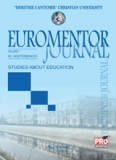ECONOMICS OF EDUCATION AS GUIDANCE TO FIGHTING INEQUALITY
ECONOMICS OF EDUCATION AS GUIDANCE TO FIGHTING INEQUALITY
Author(s): Andrei MunteanuSubject(s): Business Economy / Management, Labor relations, Welfare systems, Higher Education , Welfare services, Economic development, Marketing / Advertising
Published by: Editura Pro Universitaria
Keywords: economic sciences education; idea systems; R&D; idea production;
Summary/Abstract: Inequality is a perennial phenomenon and it is very hard to believe it will ever be totally uprooted. The problem of inequality, due to some reasons, is inherent to human nature and nevertheless, it can be qualifiedly controlled. It requires on-going skills improvement, because it is a serious source of conflict. Usually it is used for speculative and manipulating purposes by various governments, but most important, it is an immense field of actions for R&D sector and education, particularly in economic sciences education. The aim of the latter is to find answers and prove scientific grounds, in as much as to make possible avoid conflicts and foster higher living standards. Most outstanding economists and scholars of the world have researched inequality. For many peoples it is a serious challenge, for many others it is cause for worry, frequently entailed by economic depressions. The success of the humankind in avoiding eventual armed conflicts heavily depends on the ability to diminish the inequality gap. There is a complex bunch of factors and/or variables to be considered for eventually raising wellbeing, which cause inequality in different countries, including at international level. An answer to this question could be easier to understand in the context of the strong correlation between the idea systems of Economics of Education (EE) theory, International Economic Integration (IEI), and chances of getting International Comparative Advantages by less developed countries. This correlation is discussed through the angle of a comparison between potentially promising practices, in terms of economic studies and performance, and educational practices in many poor countries, which still seem to keep being ”false expectation builders”.
Journal: Euromentor Journal - Studies about education
- Issue Year: X/2019
- Issue No: 4
- Page Range: 45-62
- Page Count: 18
- Language: English

